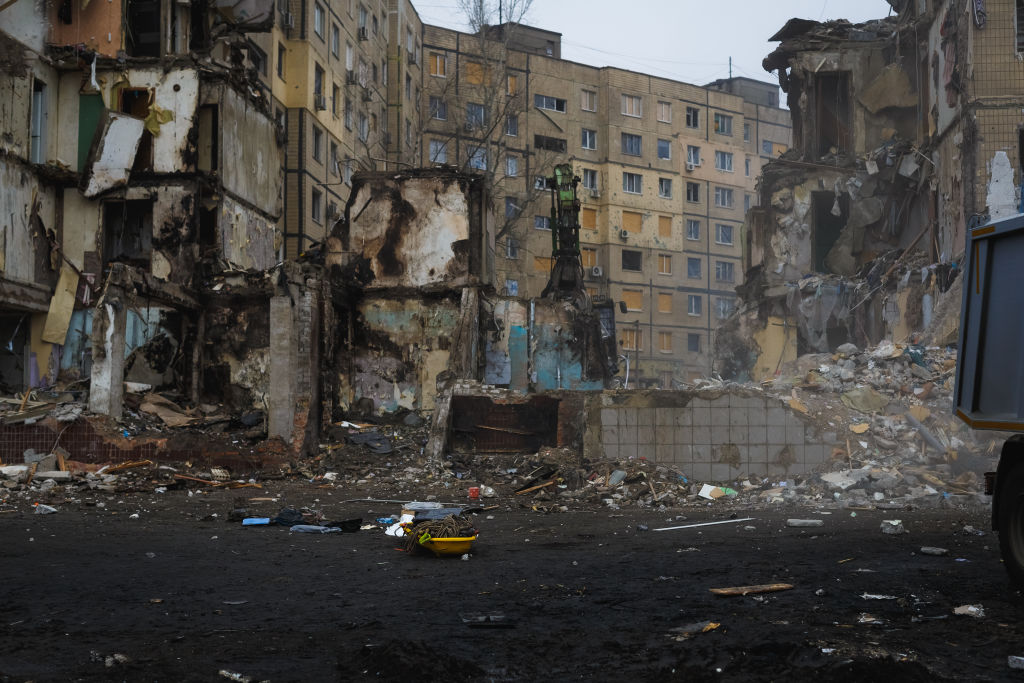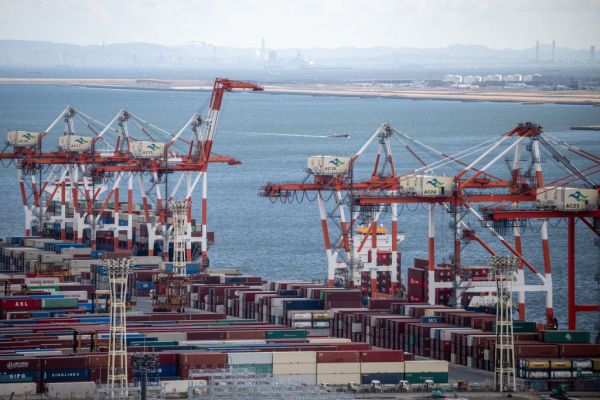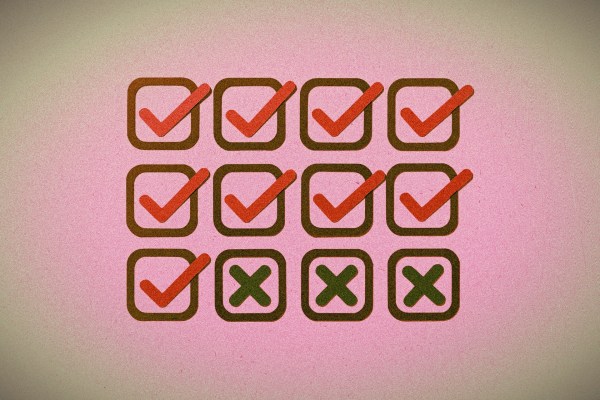Happy Friday! Archaeologists in eastern Norway say they’ve found the world’s oldest known runestone, featuring inscriptions from sometime between 1 and 250 AD.
According to a rough translation, it reads: “George Santos was here ✌️”
Quick Hits: Today’s Top Stories
- With the United States’ outstanding debt bumping up against its statutory limit, Treasury Secretary Janet Yellen informed congressional leaders on Thursday the department had begun taking “extraordinary measures”—including pausing deposits in certain government retirement funds—to prevent the federal government from defaulting on its debt. The measures will afford lawmakers approximately five months to work out a deal that either raises or suspends the country’s debt ceiling.
- After interviewing nearly 100 people, Supreme Court Marshal Gail Curley issued a 20-page report on Thursday detailing the body’s investigation into the premature leak of last year’s Dobbs ruling, concluding it was “not possible” to determine how the draft opinion ended up in Politico. “No one confessed to publicly disclosing the document and none of the available forensic and other evidence provided a basis for identifying any individual as the source of the document,” the report read. Investigators did not rule out the possibility of a hack, but said all indications were the leak came from within the institution.
- More than one million French people took to the streets Thursday to protest President Emmanuel Macron’s proposal to raise the country’s minimum retirement age from 62 (or younger, for certain sectors) to 64 by 2030. Paris essentially ground to a halt yesterday, with teachers, train conductors, refinery workers, bus drivers, and other unionized laborers going on strike. Macron and his allies argue the reforms are necessary to stave off a pension system collapse; union leaders claim the projected shortfalls can be erased by increasing employer contributions and taxes on the rich, and are planning another day of coordinated strikes for later this month.
- The Bureau of Labor Statistics reported Thursday the union membership rate in the United States declined to a record low in 2022. About 14.3 million workers—10.1 percent of the labor force—belonged to unions last year, down 0.2 percentage points from 2021. Approximately 33 percent of public-sector workers were unionized, compared to about 6 percent of private-sector workers.
- President Joe Biden amended California’s disaster declaration this week to make additional federal funding available for the state to deal with the flooding and mudslides that left at least 20 people dead in recent weeks. “I’ve instructed my administration to bring every element of the federal government together with the help of immediate needs to long-term rebuilding,” Biden said yesterday at Seacliff State Park in California.
- Officials with the Federal Aviation Administration said Thursday that last week’s computer outage—which grounded all domestic airline departures for several hours—was caused by contract workers unintentionally deleting files while working to “correct synchronization between the live primary database and a backup database.” The agency said it has found no evidence of a cyber attack or malicious intent.
- Moderna announced this week a Phase 3 trial found the company’s respiratory syncytial virus (RSV) vaccine was about 84 percent effective in preventing RSV-associated lower respiratory tract disease in participants ages 60 and older. No safety concerns were identified, and the company plans to submit the vaccine—which uses mRNA technology—for FDA approval in the coming months.
- GOP Rep. Greg Steube of Florida is recovering in the hospital after falling 25 feet off a ladder while cutting tree branches at his home in Sarasota on Wednesday. He was moved out of the intensive care unit on Thursday. Democratic Rep. Suzanne Bonamici of Oregon was also involved in an accident: She and her husband were struck by a car earlier this week while crossing a crosswalk in Portland. She was treated for a concussion and laceration to her head, and is recovering at home.
- T-Mobile revealed Thursday that a “bad actor” was able to access the personal data—name, billing address, email, phone number, date of birth—of as many as 37 million customers after tapping into one of the telecommunications company’s application programming interfaces in late November. In a filing with the Securities and Exchange Commission, T-Mobile said it was able to stop the “malicious activity” within a day of it being discovered on January 5, 2023.
- Netflix founder and co-CEO Reed Hastings announced Thursday he is stepping down from his management role after more than 20 years, handing over the reins to co-CEO Ted Sarandos and Greg Peters, the company’s chief operating officer. Hastings will remain on Netflix’s board, serving as its executive chairman.
- Santa Fe District Attorney Mary Carmack-Altwies announced Thursday actor Alec Baldwin will be charged with involuntary manslaughter for his role in the fatal shooting of cinematographer Halyna Hutchins during the filming of a movie in 2021—though legal experts believe prosecutors will have a difficult time securing a conviction. The film’s armorer, Hannah Gutierrez-Reed, will also face charges.
- The Labor Department reported Thursday that initial jobless claims—a proxy for layoffs—decreased by 15,000 week-over-week to a seasonally adjusted 190,000 last week, the smallest total since September and near historically low pre-pandemic levels.
Tanks for Nothing, Germany

At 3:30 p.m. on Saturday, a Russian missile tore a gash in a nine-story apartment building in Dnipro, Ukraine, killing more than 40 people, including an 11-month-old baby, and leaving others screaming to rescuers from underneath the rubble.
This latest attack on civilians is a painful reminder of what’s at stake as representatives from several of Ukraine’s international backers meet today at Ramstein Air Base in Germany—headquarters of NATO’s air command and the United States’ Air Force in Europe. In recent days, several nations have rolled out increasingly robust military aid packages for Ukraine with an eye toward preventing Russia from regaining offensive momentum, but a push for tanks has stalled on German reluctance.
Little territory has changed hands since we last updated you on the war, but Russian forces recently drove Ukrainians out of the now largely destroyed eastern town of Soledar and have continued to mount a bloody assault on nearby Bakhmut. Meanwhile, the Kremlin’s missile strikes have ground down Ukrainian cities and destroyed electricity infrastructure, causing persistent power outages. Ukrainian leaders want to push Russia out of its dug-in defensive lines to regain territory—but also to put more of the country’s cities out of Russian artillery range.
To that end, recent Western military aid packages have taken a turn for the armored, including vehicles designed to move Ukrainian troops safely across battlefields as they try to push forward. A joint statement outlining security assistance from nine countries including Estonia, Poland, and the Netherlands on Thursday listed now-typical support—howitzers, ammunition, training, and maintenance support—along with “hundreds more” armored vehicles and a squadron of heavily-armored Challenger 2 tanks from the United Kingdom.
The U.S. has helped lead the shift toward armored vehicles, in recent weeks offering Ukraine Bradley fighting vehicles, known as tank killers. And on Thursday, the Pentagon announced a $2.5 billion drawdown including another round of Bradleys, and—for the first time—Stryker armored vehicles, which travel faster than Bradleys on roads but have less firepower. Germany and France have also pledged their own armored vehicles.
Tanks—despite the UK’s pledge—are still a sticking point. They’re no panacea, but they offer a useful combination of movement, firepower, and armor. Western-made battle tanks could supplement the Soviet-era vehicles Ukraine has been using, which are degrading amid combat and use older ammunition that’s harder to source. Several countries—including Poland and Finland—have modern Leopard 2 tanks they’ve recently suggested they’re willing to pass along.
But those Leopard 2s were manufactured in Germany, and purchasing agreements give Berlin the right to reject any transfers to other countries. So far, it’s exercising that veto.
German Chancellor Olaf Scholz has reportedly insisted that Washington jump in first by sending its M1 Abrams tanks, but U.S. defense officials have demurred, arguing the Abrams would saddle the Ukrainian military with logistical and maintenance challenges. “It’s more of a sustainment issue,” Pentagon spokesperson Sabrina Singh told reporters. “[The Abrams] requires jet fuel, whereas the Leopard and the Challenger—it’s a different engine. They require diesel. … They can maneuver across large portions of territory before they need to refuel.” Leopards could be more easily serviced in Poland—though like much of the complex equipment that Ukrainian troops have begun using this year, they’ll still be a challenge to learn and maintain.
Germany has at times trailed other countries in its willingness to arm Ukraine, but it hasn’t been too far out of step with the Biden administration and other Western officials anxious to avoid provoking direct war with Russia or a nuclear strike against Ukraine. “I think in this case, it is genuinely misplaced prudence,” said Constanze Stelzenmüller, director of the Brookings Institution’s Center on the United States and Europe. “A slowness and deliberateness in decision-making that they think of as a virtue.” As we noted about a year ago, Germany also has some hangups on squaring off with Russia that are deeply rooted in its history.
But Stelzenmüller argued it’s time for Scholz to get over it. “Personally, as a German,” she told The Dispatch, “I don’t think we’re in a position to bargain.” The nation has sent more than $2.3 billion in military assistance to Ukraine, putting it behind only the United States and United Kingdom in absolute terms. Yet others have dug deeper into smaller pockets—Estonia has now contributed more than 1 percent of its 2022 gross domestic product in military aid.
If German officials don’t change their tune at the Ramstein Air Base meeting later today, other countries may simply start ignoring their purchaser deals and transfer the tanks despite Berlin’s wishes. Polish officials, for example, have suggested they’d be willing to go ahead without German permission. “We will do the right thing ourselves,” Polish Prime Minister Mateusz Morawiecki said Thursday. If Germany holds out, it could wind up undermining the arms control measures it aims to uphold.
But Ukraine doesn’t have forever to wait. Russian leaders are apparently laying plans for further military buildup and a spring offensive, and CIA Director William Burns reportedly visited Kyiv late last week to brief Zelensky on what to expect from the Kremlin over the next few months. Russian President Vladimir Putin recently reshuffled his top military leadership in a possible reaction to strategic setbacks, and the Russian paramilitary Wagner Group is recruiting prisoners to join the war effort. Russia used Belarus as a staging ground for the invasion last year, and the two nations are once again mounting joint exercises. Ukraine continues to put up a strong fight, but Russian commanders have demonstrated a willingness to take heavy losses to gain ground.
Meanwhile, Ukrainians can’t necessarily count on a divided U.S. Congress to refill the coffers when the recently authorized $45 billion in aid runs out. There is one possible tactical bright spot for Kyiv, however: The Biden administration’s opposition to Ukraine mounting larger attacks on Crimea is reportedly softening, with American officials aware that Russia’s positions on the occupied peninsula give it safe supply lines and installations from which to hammer Ukrainian territory.
So while the West debates whether and how many tanks to send, Ukrainian officials have grown impatient and are calling on Germany—though not by name—to drop its opposition. “True leadership is about leading by example, not about looking up to others,” Ukrainian presidential adviser Mykhailo Podolyak tweeted Thursday. “From Washington to London, from Paris to Warsaw, one thing is said: Ukraine needs tanks; tanks—the key to end war properly. Time to stop trembling at Putin and take the final step.”
Worth Your Time
- In Broadview Magazine, Dorothy Ellen Palmer tells the remarkable story of discovering her half-brother—born at the same Toronto hospital a week after she was—at age 63. “As half-siblings separated at birth, we’re a living petri dish for the study of nature vs. nurture,” she writes. “Don grew up in a loving home. I did not. Don speaks English and French. I’m not so lucky. He’s an athlete and a hockey coach. I’m disabled. I’m an English teacher and writer; my brother the electrician isn’t much of a reader anymore. We are both divorced or separated and raised two children in homes with springer spaniels. He’s delighted the glass is half full while I’m already analyzing why the bloody thing is so empty. And yet, in his blue-grey eyes, I see my own. I find comfort, kindness and something for which I will always be thankful: a brother’s open heart.”
- If you find yourself in New York in the next month or two, the Whitney Museum’s new Edward Hopper exhibition is worth checking out. “Hopper caught that the seeming sadness of city life is also part of its gaiety,” Adam Gopnik writes in The New Yorker. “Everything about the urban life he shows us is isolated, uncommunal—and yet his images of apparent loneliness seem somehow anything but grim, rather proudly self-reliant. (Times Square, Macy’s—all those gathering places, with New Yorkers as frantic as water bugs when the light goes on, as Florine Stettheimer loved to sing, are nowhere in his work.) We somehow find more credible and—a strange but significant point—more comforting the imagery of isolation than we do that of gathering. And suddenly a tug on the heart suggests why this exhibition is so crowded and feels so alive: what we missed in the absence of crowds is the opportunity for solitude. Having seen at last an unpeopled New York, we realize now that our best life in this city lies in being unseen in too-seen places, overlooked while others are looking, left alone to become our secret selves.”
Rest in Peace, David Crosby
David Crosby—a founding member of the Byrds and Crosby, Stills & Nash—died on Thursday at the age of 81. “Music is a lifting force. I think it makes things better, it makes people happy,” the legendary folk rocker told Consequence in 2021. “I’m sort of at the end of my life. We know that. However much time I got isn’t really the significant thing—it’s what I do with that time, right? And it looks to me that the only contribution I can make, the place where I can help, is to make more music and do it really well. And spend whatever time I do have, trying to make it better. Trying to make more music.”
Presented Without Comment
Also Presented Without Comment
Also Also Presented Without Comment
Toeing the Company Line
- The pot on the stove is getting a little crowded, with Nick pumping out two Boiling Frogs (🔒) on Thursday. After examining the latest twists in the George Santos saga—he’s not just a liar, he’s a weird liar—Nick dives into the coming debt ceiling fight. “We’re barreling toward a cliff and the people in the driver’s seat have no intention of changing course,” he writes. “But there’s a way cooler heads can jerk the wheel in time.”
- Nothing like a seven-hour flight delay to really clarify the importance of air traffic control system reform. “There’s a better way to manage national ATC systems—privatization,” Scott writes in this week’s Capitolism (🔒). “There is no good reason for the U.S. government to run the ATC system, and decoupling it from the FAA would improve ATC operations and avoid its longstanding problems.”
- On Thursday’s episode of The Dispatch Podcast, Sarah, Jonah, and David discuss the next stage of the war in Ukraine and the Republican Party’s commitment (or lack thereof) to fiscal responsibility. What would “balancing the budget” actually look like? Plus: an extra salty Not Worth Your Time.
- On the site today, Emanuele Ottolenghi makes the case for upping pressure on Iran’s aviation sector, Price lays out possible repercussions for Santos as the lawmaker’s lies stack up, and Alec reports on a surprising challenge facing the U.S. medical community: monkey shortages.
Let Us Know
Is Germany right to be worried about provoking Vladimir Putin? Or should the West step up efforts to help Ukrainians win the war—as opposed to helping prevent them from losing it?






Please note that we at The Dispatch hold ourselves, our work, and our commenters to a higher standard than other places on the internet. We welcome comments that foster genuine debate or discussion—including comments critical of us or our work—but responses that include ad hominem attacks on fellow Dispatch members or are intended to stoke fear and anger may be moderated.
With your membership, you only have the ability to comment on The Morning Dispatch articles. Consider upgrading to join the conversation everywhere.